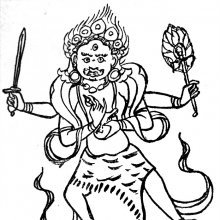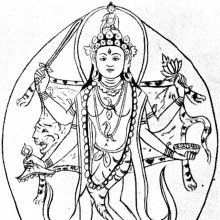Krishnananda, Kṛṣṇānanda: 5 definitions
Introduction:
Krishnananda means something in Hinduism, Sanskrit. If you want to know the exact meaning, history, etymology or English translation of this term then check out the descriptions on this page. Add your comment or reference to a book if you want to contribute to this summary article.
The Sanskrit term Kṛṣṇānanda can be transliterated into English as Krsnananda or Krishnananda, using the IAST transliteration scheme (?).
Images (photo gallery)
In Hinduism
Purana and Itihasa (epic history)
Source: archive.org: Puranic EncyclopediaKṛṣṇānanda (कृष्णानन्द).—A Sanskrit poet who li ed in the 13th century A.D. He is the author of Sahṛdayānanda Kāvya which contains fifteen cantos. The theme is the story of Nala.

The Purana (पुराण, purāṇas) refers to Sanskrit literature preserving ancient India’s vast cultural history, including historical legends, religious ceremonies, various arts and sciences. The eighteen mahapuranas total over 400,000 shlokas (metrical couplets) and date to at least several centuries BCE.
Languages of India and abroad
Sanskrit dictionary
Source: Cologne Digital Sanskrit Dictionaries: Aufrecht Catalogus Catalogorum1) Kṛṣṇānanda (कृष्णानन्द) as mentioned in Aufrecht’s Catalogus Catalogorum:—See Acyutakṛṣṇānanda.
2) Kṛṣṇānanda (कृष्णानन्द):—guru of Nṛsiṃha Sarasvatī (Subodhinī). Hall. p. 101. Ben. 78.
3) Kṛṣṇānanda (कृष्णानन्द):—Tattvabodhinī [tantric] L. 281.
4) Kṛṣṇānanda (कृष्णानन्द):—Tantrasāra.
5) Kṛṣṇānanda (कृष्णानन्द):—Taittirīyopaniṣadvyākhyā. Oppert. 4412. Ii, 2485. 6286. See Bālakṛṣṇānanda.
6) Kṛṣṇānanda (कृष्णानन्द):—Mānasollāsa. B. 4, 82.
7) Kṛṣṇānanda (कृष्णानन्द):—Viṣṇusahasranāmabhāṣya. Oppert. Ii, 10095.
8) Kṛṣṇānanda (कृष्णानन्द):—Sahṛdayānanda kāvya. K. 66.
9) Kṛṣṇānanda (कृष्णानन्द):—(?): Sāṃkhyakārikā. NW. 388.
10) Kṛṣṇānanda (कृष्णानन्द):—Siddhāntasiddhāñjana, vedānta.
11) Kṛṣṇānanda (कृष्णानन्द):—Jñānānandataraṅgiṇī [dharma]
12) Kṛṣṇānanda (कृष्णानन्द):—Devīmāhātmyaṭīkā Siddhāntamañjarī.
13) Kṛṣṇānanda (कृष्णानन्द):—Ṣaṭkarmadīpikā [tantric]
14) Kṛṣṇānanda (कृष्णानन्द):—C. on Vidyābhūṣaṇa’s Sāhityakaumudī.
15) Kṛṣṇānanda (कृष्णानन्द):—C. Prabhā on Śrīnivāsa’s Śuddhidīpikā jy.
16) Kṛṣṇānanda (कृष्णानन्द):—Vāsanārasāyana astron.
Kṛṣṇānanda has the following synonyms: Bālakṛṣṇānanda.
Source: Cologne Digital Sanskrit Dictionaries: Monier-Williams Sanskrit-English Dictionary1) Kṛṣṇānanda (कृष्णानन्द):—[from kṛṣṇa] m. Name of a scholiast
2) [v.s. ...] of the author of the Tantra-sāra
[Sanskrit to German]
Sanskrit, also spelled संस्कृतम् (saṃskṛtam), is an ancient language of India commonly seen as the grandmother of the Indo-European language family (even English!). Closely allied with Prakrit and Pali, Sanskrit is more exhaustive in both grammar and terms and has the most extensive collection of literature in the world, greatly surpassing its sister-languages Greek and Latin.
See also (Relevant definitions)
Starts with: Krishnananda sarasvati, Krishnananda sharman, Krishnananda vagishvara bhattacarya, Krishnananda yogendra, Krishnanandacala, Krishnanandana, Krishnanandasvamin.
Ends with: Acyutakrishnananda, Balakrishnananda, Ramakrishnananda, Sri Balakrishnananda.
Full-text (+20): Balakrishnananda, Krishnanandasvamin, Tantrasara, Nrisimha sarasvati, Sahridayananda, Krishnananda vagishvara bhattacarya, Ramakrishnanandatirtha, Krishnananda sarasvati, Balakrishna, Vasanarasayana, Krishnananda sharman, Krishnananda yogendra, Ramakrishnananda, Shatkarmadipika, Tattvabodhini, Anubhavananda, Bhuvanananda, Brahmananda bharati, Sahityakaumudi, Amritanandanatha.
Relevant text
Search found 13 books and stories containing Krishnananda, Kṛṣṇānanda, Krsnananda; (plurals include: Krishnanandas, Kṛṣṇānandas, Krsnanandas). You can also click to the full overview containing English textual excerpts. Below are direct links for the most relevant articles:
Chaitanya Bhagavata (by Bhumipati Dāsa)
Verse 1.16.133 < [Chapter 16 - The Glories of Śrī Haridāsa Ṭhākura]
Verse 2.1.297 < [Chapter 1 - The Beginning of the Lord’s Manifestation and His Instructions on Kṛṣṇa-saṅkīrtana]
Verse 2.13.336-339 < [Chapter 13 - The Deliverance of Jagāi and Mādhāi]
Jainism and Patanjali Yoga (Comparative Study) (by Deepak bagadia)
Part 9 - Modern Philosophy: Indian and Western < [Chapter 1 - Introduction]
The Indian Buddhist Iconography (by Benoytosh Bhattachacharyya)
Varahi Tantra (English Study) (by Roberta Pamio)
Preceptors of Advaita (by T. M. P. Mahadevan)
(iii) Tāṇḍavarāya < [56. Some Authors of Works in Regional Languages]
Kashyapa Shilpa-shastra (study) (by K. Vidyuta)
5.2. Classification of the Āgamas < [Chapter 1 - Introduction]

